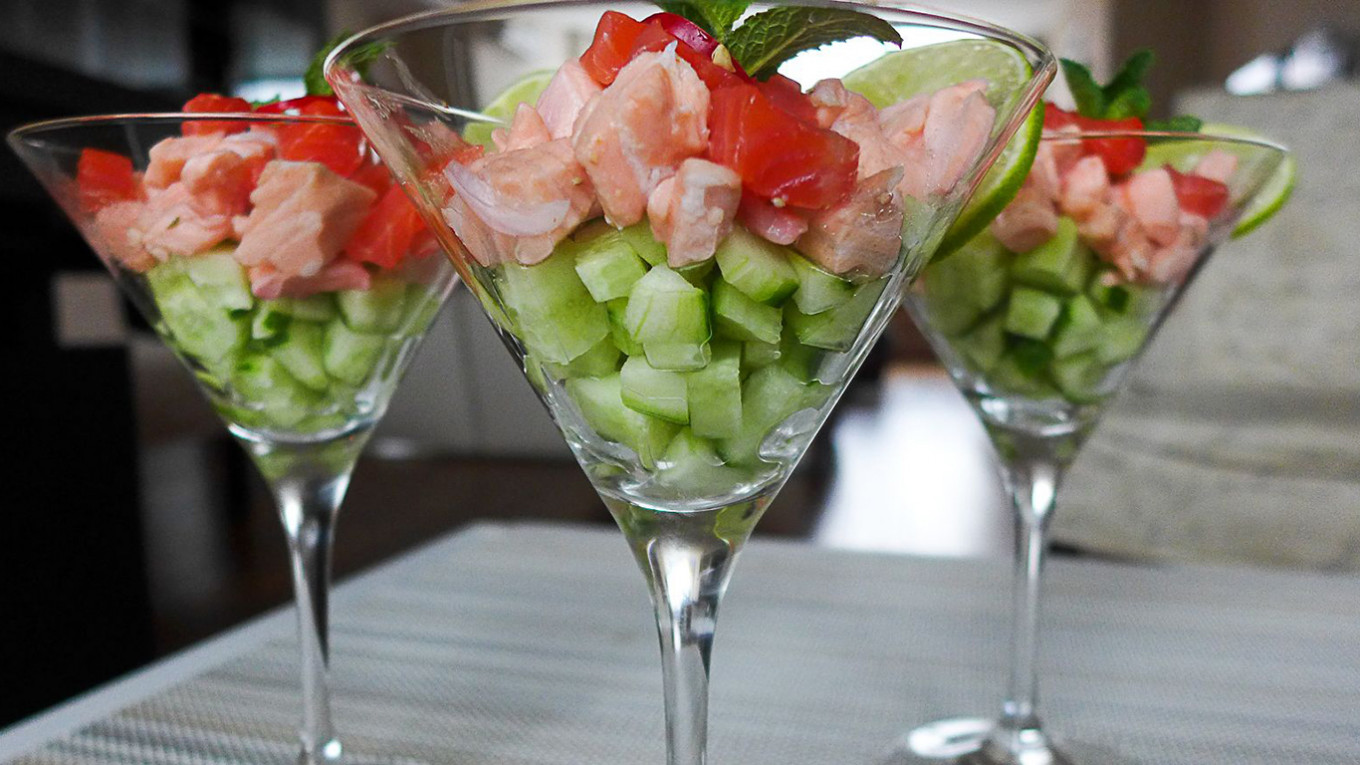Somewhere in the early 2000s, it became okay to play with our food.
Not in the sense of rolling it up into balls and hurling it at one another, but to pair traditional ingredients with non-traditional methods of preparation or vice versa. Until then, everyone had dutifully stayed in his lane: sushi was sushi, but you wouldn’t put wasabi in traditional rassolnik soup (spoiler: it’s great!) nor use garam marsala in beef Stroganoff (equally successful!) But somehow Moscow’s cooler chefs got the memo, and suddenly there was an explosion of innovation. Calves brains in yogurt, lightly pickled apricots, and sea buckthorn berries in absolutely everything. Like most innovations, it took some time to trickle down from the ultra-chic hipsters to the sleepy neighborhoods of Moscow, but we got there eventually, and before too long, Muscovite housewives were dragging heavy deep fryer out to their dacha with pounds of tempura mix.
It was a heady time, and I jumped in feet first.
Though sushi had reigned for over two decades as Moscow’s favorite fast food, it took my husband and his friends and family a while to warm up to ceviche. Raw fish lightly cooked in citrus juice didn’t have universal appeal amongst this set: it was just too radical a notion, even if almost every chef in Moscow was ceviche-ing anything that swam. So I introduced it stealthily — a tiny bit on top of a creamy fish soup as a garnish. It was a total hit, paving the way for a full-blown tuna and avocado ceviche and salmon and cucumber ceviche to appear in regular rotation. Today, these are firm favorites, particularly at the height of summer when cooking with anything hotter than a lime is distinctly unappealing.
Moscow is a long way from Latin America, where ceviche is an integral part of each nation’s cuisine. But ceviche’s origins may lie much closer to Russia, according to many culinary scholars and etymologists, who confidently trace both the word and the method back to the ancient Persian Empire.
From there, ceviche made its way to the lush land of Al-Andalus sometime during the eight hundred-year Muslim reign in southern Spain. Here the abundant Mediterranean fish and seafood were matched with produce from the many orange and lime trees planted by the Muslims for their fruit and delicious scent. Today in Seville, the port from which many of the famous Spanish expeditions to the New World departed, ceviche is a popular item on non-traditional tapas menus, and it is not too much of a leap of the imagination that the knowledge of ceviche traveled aboard one of the mighty Spanish galleons bound for Latin America.
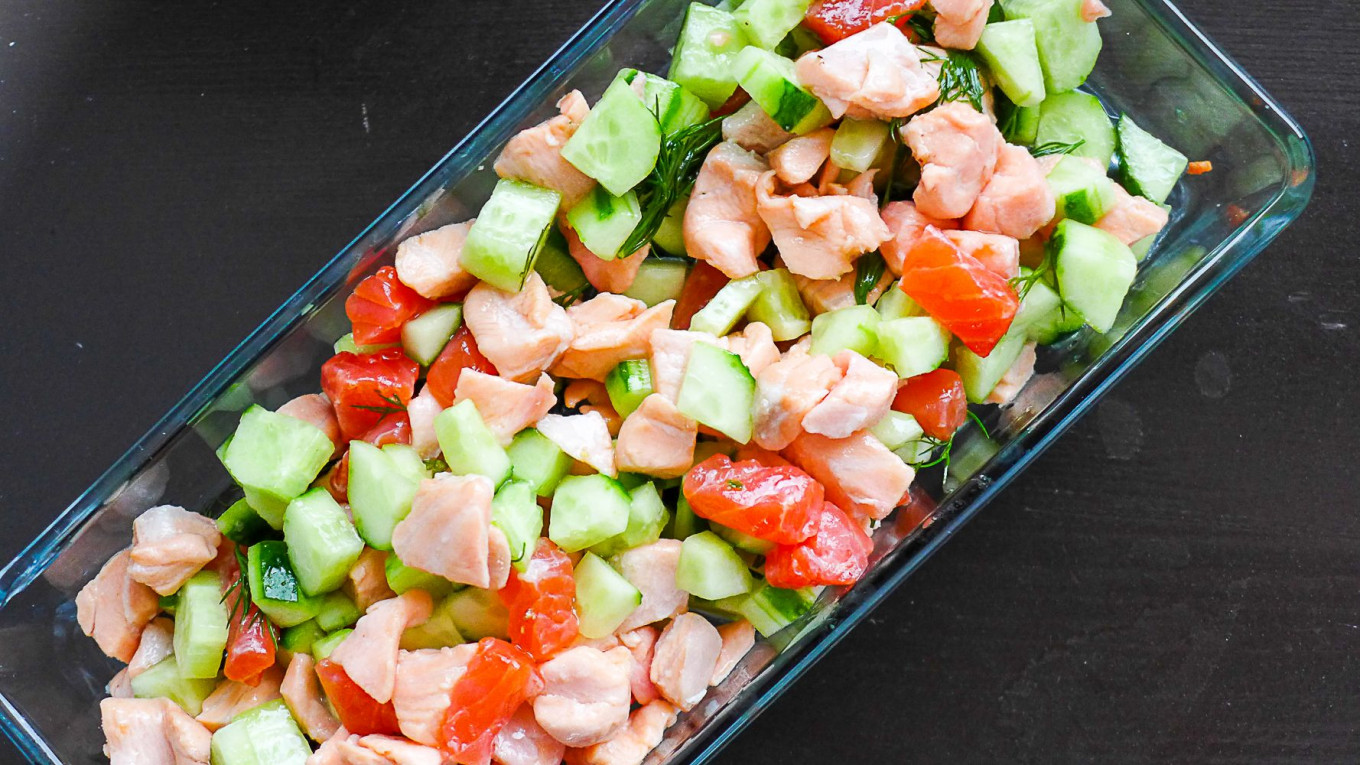
Though landlocked, Moscow is proud of its designation as “The Port of Five Seas,” and anyone who has strolled through Moscow’s sprawling food markets knows we are delightfully spoiled for choice for fish and seafood, both domestic and imported. I like to stick with classic Russian ingredient pairings, so salmon and cucumber with fresh herbs make the most regular appearance. This is a highly flexible recipe that has proven equally popular, dumped into a communal bowl as a snack as it when served in martini glasses as an elegant appetizer. Adding a bit of smoked or cured salmon to the mix is a nice touch as is something briny like capers. Play around until you find your favorite interpretation.
Important Note:
Ceviche can be a bacterial disaster waiting to happen if your fish is not fresh and your tools as clean as you can make them. For best results, buy, make, and consume your fish on the same day. Sterilize your bowl, serving dishes, and knives with boiling water prior to getting to work. Be sure to leave the mixture to “cure” at least four hours.
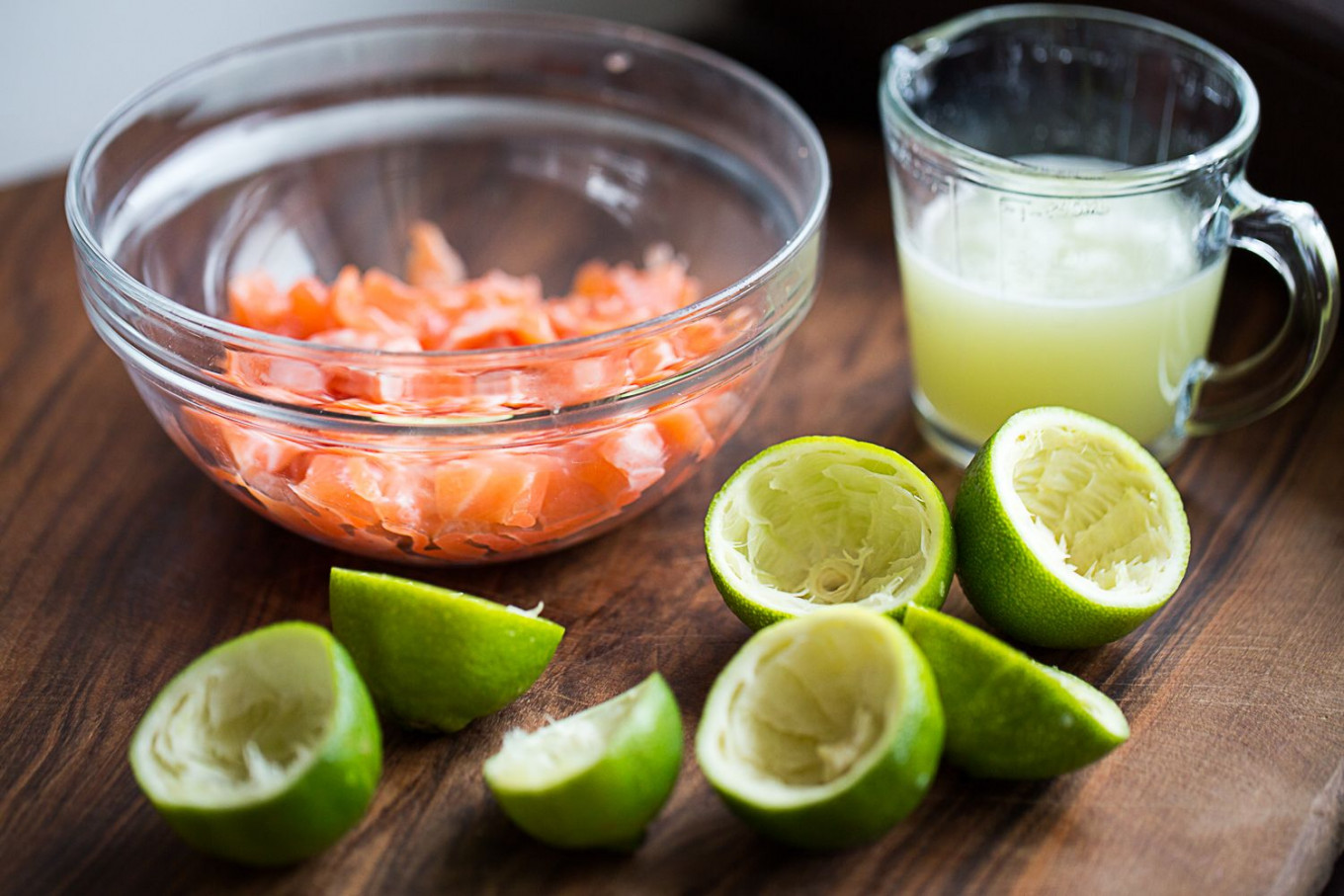
Slavic Ceviche
Ingredients
- 1 lb. (500 g) of the freshest possible salmon, deboned and cut into ¼-inch cubes
- Juice of 4-6 limes (you want about ⅔ cup liquid)
- ⅓ cup (80 ml) of cucumber juice (or cucumber whizzed up in the blender)
- 1 Tbsp flakey sea salt
- Half of one small red onion, very finely sliced with a mandoline or diced
- Ice water
- 3 Tbsp dill, chopped
- 3 Tbsp mint, chopped
- 2 medium-sized cucumbers, peeled and diced into ¼-inch cubes
- 2 tsp olive oil
Optional Garnish
- 2 Tbsp of capers
- ½ cup of smoked or cured salmon cut into a ¼-inch cubes
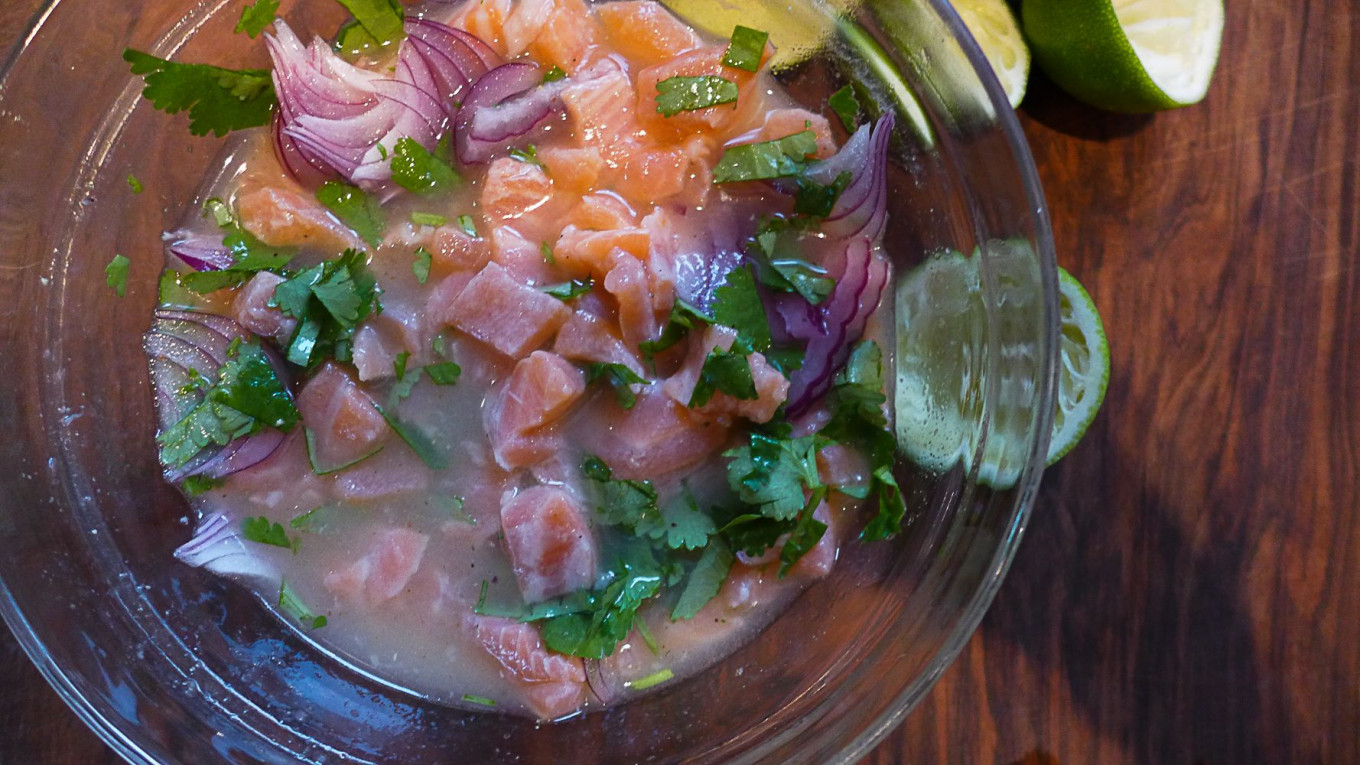
Instructions
- Place the onion slices in ice water for 30 minutes, then pat dry.
- Combine the salmon, onion, flakey sea salt, and lime and cucumber juices in a non-reactive bowl and toss to combine.
- Cover and refrigerate for 4 hours. The salmon will be “cooked” when it turns a lighter shade of pink throughout.
- Just before serving, toss the salmon with the olive oil and diced cucumbers and fresh herbs. Taste and adjust seasoning with fresh ground pepper or more salt.
- Garnish with cured salmon and capers (if using).
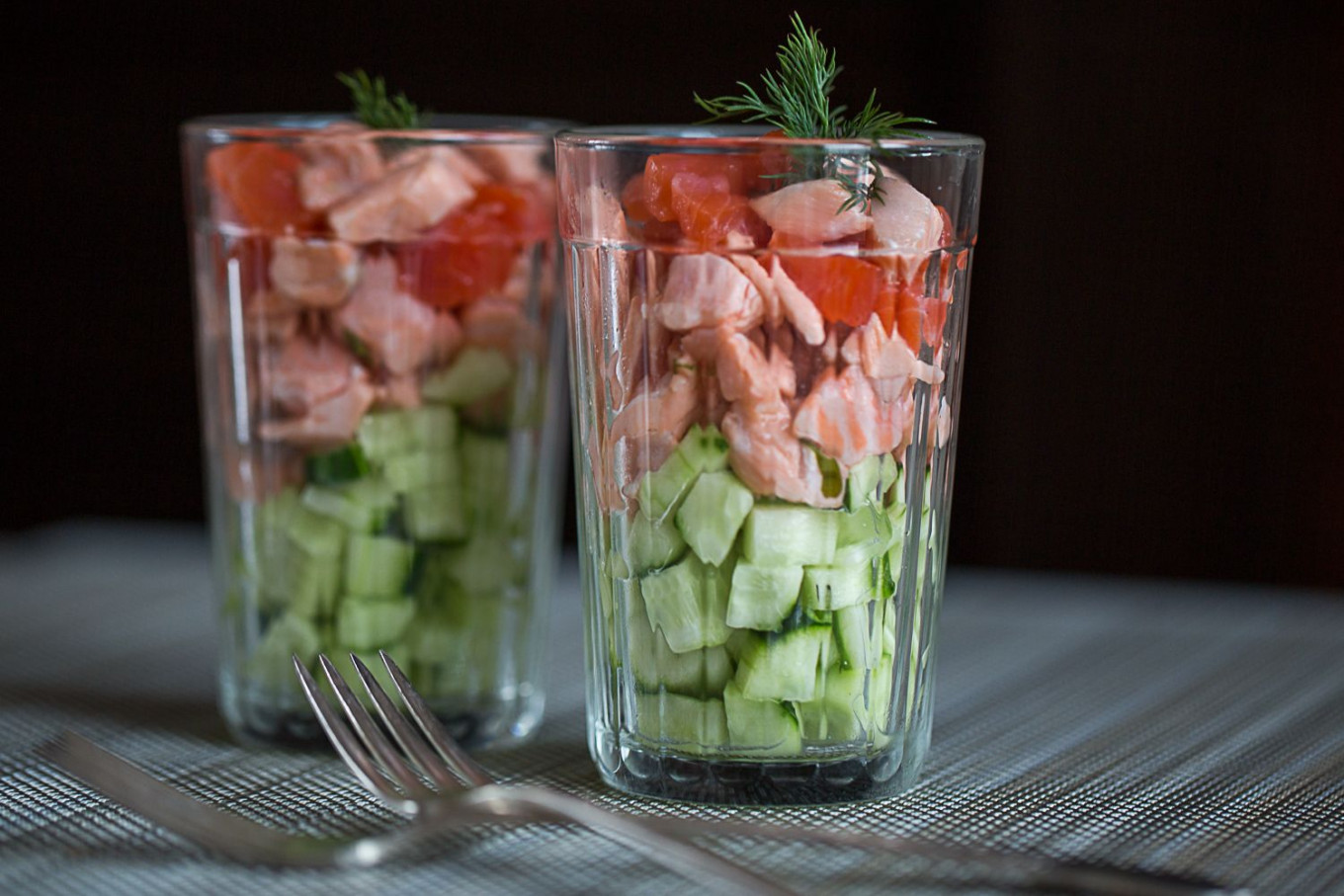
A Message from The Moscow Times:
Dear readers,
We are facing unprecedented challenges. Russia's Prosecutor General's Office has designated The Moscow Times as an "undesirable" organization, criminalizing our work and putting our staff at risk of prosecution. This follows our earlier unjust labeling as a "foreign agent."
These actions are direct attempts to silence independent journalism in Russia. The authorities claim our work "discredits the decisions of the Russian leadership." We see things differently: we strive to provide accurate, unbiased reporting on Russia.
We, the journalists of The Moscow Times, refuse to be silenced. But to continue our work, we need your help.
Your support, no matter how small, makes a world of difference. If you can, please support us monthly starting from just $2. It's quick to set up, and every contribution makes a significant impact.
By supporting The Moscow Times, you're defending open, independent journalism in the face of repression. Thank you for standing with us.
Remind me later.



